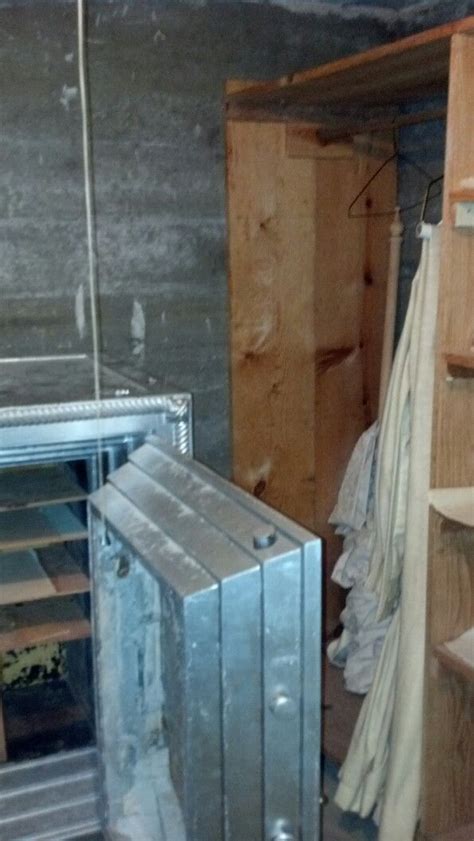
A first-time homeowner in LaBelle, Florida, experienced a shocking discovery while cleaning her newly purchased home: a hidden stash of cash and a handwritten note tucked behind a panel in the refrigerator.
LA BELLE, FL – Natasha Booth, a 32-year-old first-time homeowner, stumbled upon an unexpected windfall while cleaning her newly acquired residence in LaBelle, Florida. Booth discovered a hidden compartment behind a panel in the refrigerator containing a significant amount of cash and a cryptic handwritten note. The discovery has transformed a routine cleaning task into an intriguing mystery and a financial boost for the young homeowner.
Booth, who had just moved into her first house, was meticulously cleaning the appliances when she noticed something unusual about the refrigerator. “I was cleaning the refrigerator, and I saw something behind it. I pulled it out, and there was like a panel,” Booth told WINK News. Upon further investigation, she found the hidden stash.
The discovery consisted of a substantial amount of U.S. currency, the exact amount of which Booth has chosen not to disclose publicly, and a handwritten note offering cryptic advice. The note read, “Congrats on buying the house,” followed by what Booth described as “cryptic advice.” The unexpected find has turned Booth’s first home purchase into an unforgettable experience, blending the excitement of ownership with an element of mystery.
“I was cleaning the refrigerator, and I saw something behind it. I pulled it out, and there was like a panel,” Booth recounted, detailing the moment she realized something was hidden. Her initial reaction was a mix of disbelief and excitement. After finding the money and the note, Booth shared her discovery on social media, where her story quickly went viral, capturing the attention of thousands.
Booth’s story resonated widely, drawing attention from local news outlets and capturing the imagination of people online. Many have speculated about the origin of the money and the meaning of the cryptic note. Some suggest it could be a leftover from a previous owner, while others propose more elaborate theories involving hidden treasures or forgotten secrets.
The online reaction to Booth’s discovery has been overwhelmingly positive, with many users congratulating her and expressing their fascination with the story. Some have even offered suggestions on how she should use the money, ranging from investing it wisely to using it to pay off her mortgage. The incident has also sparked a broader conversation about the hidden histories that homes can hold and the unexpected surprises that can await new homeowners.
The origins of the money and the meaning of the note remain unknown, adding an element of intrigue to the story. Booth has indicated that she intends to use a portion of the money to improve her new home, while also saving some for future needs. She has also expressed interest in trying to uncover the story behind the hidden stash, perhaps by reaching out to previous owners or researching the history of the property.
The discovery has turned what would have been a standard move-in process into an exciting adventure for Booth. As she settles into her new home, she carries with her the knowledge that her house holds secrets and the potential for further discoveries. Her experience serves as a reminder that homeownership can bring unexpected joys and surprises, turning a simple purchase into a journey of exploration and discovery.
While the exact amount of money found remains undisclosed, the discovery represents a significant and welcome surprise for the first-time homeowner. Booth is now considering how to best use her newfound wealth, balancing immediate needs with long-term financial planning. The story highlights the unpredictable nature of homeownership and the potential for uncovering hidden treasures in the most unexpected places.
The incident serves as a fascinating example of how everyday life can intersect with mystery and intrigue. Booth’s experience has captured the attention of a wide audience, reminding us that homes are not just buildings but also repositories of history and personal stories. As she continues to settle into her new home, she does so with a unique tale to tell and a newfound appreciation for the surprises that life can offer.
Booth’s experience has also sparked a broader discussion about the ethics of keeping found money. While she is legally entitled to the money, some have suggested that she should attempt to return it to its rightful owner. However, given the cryptic nature of the note and the lack of any identifying information, tracing the money’s origins may prove difficult.
As Booth navigates this unexpected situation, she is focusing on the positive aspects of her discovery and the opportunities it presents. She views the money as a blessing and intends to use it wisely to improve her life and her new home. Her story is a testament to the power of serendipity and the potential for good fortune to come in the most unexpected ways.
In conclusion, Natasha Booth’s discovery of a hidden stash of cash and a cryptic note in her new refrigerator is a remarkable and intriguing story. It highlights the surprises that can accompany homeownership and the potential for uncovering hidden histories within the walls of a home. As Booth settles into her new life in LaBelle, she does so with a unique and memorable experience that has captured the imagination of people across the internet.
The story is a testament to the idea that every home has a story, and sometimes, those stories reveal themselves in the most unexpected ways. For Natasha Booth, her first home purchase has become an unforgettable adventure, filled with mystery, excitement, and the promise of a bright future.
Delving Deeper: The Context and Implications of the Discovery
Natasha Booth’s story transcends a simple find; it underscores several significant aspects of homeownership, personal finance, and the enduring human fascination with the unknown. By examining these broader implications, we can better understand the appeal and relevance of this unique discovery.
Homeownership and Unexpected Encounters:
For many, purchasing a home represents the pinnacle of financial and personal achievement. It’s a milestone filled with anticipation and excitement, but also with the practical realities of maintenance, repairs, and the general responsibilities of property ownership. Booth’s experience introduces an element of unpredictability into this landscape. It reminds us that homes are not just structures, but repositories of past lives, experiences, and, in some cases, secrets.
The discovery of hidden items in homes is not entirely uncommon, though finding cash is certainly more dramatic than uncovering old furniture or forgotten documents. These discoveries can range from harmless curiosities to significant historical artifacts, each offering a glimpse into the lives of previous occupants. In Booth’s case, the cash and the cryptic note elevate the find from a simple curiosity to a compelling mystery.
Financial Windfall and Responsible Management:
The unexpected windfall presents Booth with both an opportunity and a responsibility. While the exact amount of money remains undisclosed, it is presumably substantial enough to warrant careful consideration of its use. Financial advisors often recommend that sudden increases in wealth be approached with a strategic plan, balancing immediate needs with long-term financial goals.
Options for managing the money could include:
- Paying down debt: Reducing mortgage payments or other outstanding debts can provide immediate financial relief and improve long-term stability.
- Investing: Allocating a portion of the money to investment accounts, such as stocks, bonds, or mutual funds, can generate future income and grow wealth over time.
- Home improvements: Investing in renovations or repairs can increase the value of the property and enhance its livability.
- Emergency fund: Setting aside a portion of the money as an emergency fund can provide a safety net for unexpected expenses.
- Charitable giving: Donating to a cause or organization that aligns with Booth’s values can provide personal satisfaction and contribute to the greater good.
The Allure of Mystery and Speculation:
The cryptic note accompanying the cash adds an element of intrigue that has captivated the public’s imagination. The note, described as containing “cryptic advice,” has sparked widespread speculation about its meaning and the identity of its author. Was it a message from a previous owner offering guidance to the new occupant? Or perhaps a remnant of a more complex story involving hidden treasures or forgotten secrets?
The lack of clear answers fuels the mystery and invites people to imagine their own scenarios. This element of speculation taps into a deep-seated human fascination with the unknown and the desire to uncover hidden truths. It also highlights the power of storytelling and the way in which even a simple discovery can become a compelling narrative.
Ethical Considerations and the Dilemma of Found Money:
The discovery of a significant amount of cash raises ethical questions about ownership and responsibility. While Booth is legally entitled to keep the money, some argue that she has a moral obligation to attempt to identify its rightful owner. This dilemma highlights the tension between personal gain and ethical conduct.
In situations involving found property, legal frameworks typically prioritize the rights of the original owner. However, in cases where the owner cannot be identified, the finder may be entitled to claim ownership after a reasonable period of time. The specific laws governing found property vary by jurisdiction, but they generally reflect a balance between protecting the rights of the owner and rewarding honest finders.
Booth’s decision to keep the money is understandable, given the lack of any identifying information and the challenges of tracing its origins. However, the ethical considerations surrounding the discovery remain a relevant topic for discussion.
Social Media and the Spread of Viral Stories:
Booth’s story gained widespread attention through social media, demonstrating the power of these platforms to amplify personal experiences and create viral sensations. The ease with which information can be shared online has transformed the way in which news and stories are disseminated, allowing individuals to reach a global audience with a single post.
Social media platforms can also serve as valuable tools for connecting with others and seeking information. In Booth’s case, sharing her story online allowed her to receive support and advice from a wide range of people. It also sparked conversations about homeownership, personal finance, and the ethical considerations of found money.
However, the rapid spread of information on social media also presents challenges. Misinformation and rumors can spread quickly, and it can be difficult to verify the accuracy of online claims. It is important to approach social media content with a critical eye and to rely on reputable sources for factual information.
The Enduring Appeal of Hidden Treasures:
The story of Natasha Booth’s discovery taps into a long-standing human fascination with hidden treasures. From pirate loot to buried gold, the idea of uncovering hidden wealth has captured the imagination of people for centuries. This fascination is reflected in countless stories, movies, and legends that celebrate the thrill of discovery and the promise of unexpected riches.
The allure of hidden treasures is rooted in a combination of factors, including the desire for financial security, the excitement of adventure, and the satisfaction of solving a mystery. It also reflects a deeper longing for the extraordinary in everyday life. The discovery of hidden cash in a refrigerator may not be as grand as finding a chest of gold coins, but it offers a similar sense of wonder and possibility.
Conclusion: A Story of Serendipity and the Unpredictability of Life
Natasha Booth’s discovery of hidden cash and a cryptic note in her new refrigerator is a remarkable story that highlights the surprises and mysteries that can accompany homeownership. It underscores the importance of responsible financial management, the enduring appeal of hidden treasures, and the power of social media to amplify personal experiences. As Booth settles into her new home, she does so with a unique and memorable tale that serves as a reminder of the unpredictability and serendipity of life. Her experience is a testament to the idea that even the most ordinary of circumstances can hold the potential for extraordinary discoveries.
The Local Context: LaBelle, Florida
To fully appreciate the narrative, it’s essential to consider the setting: LaBelle, Florida. LaBelle is a small, rural town located in Hendry County, in the southwestern part of the state. Known for its agricultural roots, particularly its citrus and cattle industries, LaBelle offers a quieter, more laid-back lifestyle compared to Florida’s bustling coastal cities.
The community is tight-knit, and news tends to travel quickly. This likely contributed to the rapid spread of Booth’s story within the town and beyond. The median household income in Hendry County is lower than the state average, making Booth’s discovery all the more impactful for her and potentially for the local economy if she chooses to invest some of the money locally.
The real estate market in LaBelle is generally more affordable than in many other parts of Florida, which might explain why Booth, as a first-time homebuyer, chose to settle there. The housing stock likely includes a mix of older and newer homes, each with its own history and potential for hidden surprises.
Expanding on the Cryptic Note:
The “cryptic advice” mentioned in the note is perhaps the most intriguing element of the story. Without knowing the exact wording, it’s impossible to decipher its intended meaning. However, one can speculate about the possibilities:
- Practical advice: The note could contain practical tips related to the house itself, such as information about its maintenance, quirks, or previous repairs.
- Financial advice: It might offer suggestions on how to manage money wisely, based on the experiences of the previous owner.
- Life advice: The note could contain more general advice about life, happiness, or personal fulfillment.
- A coded message: It’s also possible that the note is a coded message, intended for someone else or containing a hidden meaning that can only be deciphered with additional clues.
The ambiguity of the note adds a layer of mystery to the story, inviting further investigation and speculation. It also raises questions about the intentions of the person who left it behind. Were they trying to help the new homeowner, or were they simply playing a prank?
The Impact on Booth’s Life:
Regardless of the origins of the money and the meaning of the note, Booth’s life has undoubtedly been changed by this discovery. In addition to the financial benefits, she has also gained a unique and memorable experience that she will likely cherish for years to come.
The story has also brought her a degree of public attention, which can be both positive and challenging. While she has received an outpouring of support and congratulations, she has also had to navigate the challenges of maintaining her privacy and managing the expectations of others.
Ultimately, Booth’s story is a reminder that life is full of surprises and that even the most ordinary of circumstances can hold the potential for extraordinary discoveries. Her experience is a testament to the power of serendipity and the importance of embracing the unexpected.
Frequently Asked Questions (FAQ)
-
Where did the homeowner find the money?
The homeowner, Natasha Booth, found the money hidden behind a panel in the refrigerator of her new house in LaBelle, Florida.
-
Was there anything else found with the money?
Yes, along with the cash, Booth found a handwritten note containing what she described as “cryptic advice.”
-
Has the homeowner disclosed the amount of money found?
No, Natasha Booth has chosen not to disclose the exact amount of money she discovered.
-
What does the homeowner plan to do with the money?
Booth intends to use a portion of the money to improve her new home and save some for future needs.
-
Has anyone come forward claiming to be the owner of the money?
As of the latest reports, no one has come forward to claim ownership of the money.
Additional Analysis and Expanded Context:
The story of Natasha Booth’s unexpected discovery provides a lens through which to examine broader societal trends and individual behaviors. Beyond the immediate excitement of finding a hidden stash of cash, several underlying themes resonate with contemporary audiences.
The Dream of Homeownership:
In many cultures, owning a home represents stability, security, and the fulfillment of a lifelong dream. However, the path to homeownership is often fraught with challenges, including financial constraints, competitive markets, and the daunting prospect of long-term debt. Booth’s story offers a glimmer of hope to aspiring homeowners, suggesting that even in the face of these challenges, unexpected blessings can occur.
Her experience also underscores the importance of due diligence when purchasing a home. While most buyers focus on the structural integrity, location, and overall condition of the property, Booth’s discovery highlights the potential for uncovering hidden surprises, both good and bad.
The Psychology of Finding:
The act of finding something valuable triggers a complex range of emotions, from excitement and disbelief to gratitude and responsibility. Psychologists have studied the psychology of finding, noting that it can activate reward centers in the brain, leading to feelings of euphoria and satisfaction.
However, the discovery of found money also raises ethical dilemmas. Should the finder attempt to locate the original owner? Or is it acceptable to keep the money, especially if the owner cannot be identified? These questions often spark heated debates, reflecting differing values and moral compasses.
The Role of Community:
In small towns like LaBelle, community bonds are often strong, and local news spreads quickly. Booth’s story likely resonated deeply with her neighbors, who may have experienced similar challenges or dreams of their own. The community’s reaction to her discovery can provide insights into local values and social dynamics.
Moreover, the story highlights the power of social media to connect people and amplify personal experiences. By sharing her discovery online, Booth reached a global audience, sparking conversations and generating interest far beyond her local community.
The Legacy of Past Owners:
Every home has a history, shaped by the lives of its previous occupants. Booth’s discovery serves as a tangible reminder of this history, offering a glimpse into the lives and values of those who lived in the house before her. The hidden cash and the cryptic note suggest a story that may never be fully uncovered, leaving room for speculation and imagination.
The story also raises questions about the previous owner’s motivations. Why did they leave the money behind? Was it intended for someone specific, or was it simply forgotten? These questions add a layer of intrigue to the story, transforming a simple discovery into a compelling mystery.
Financial Literacy and Planning:
Booth’s unexpected windfall presents her with a unique opportunity to improve her financial situation. However, it also underscores the importance of financial literacy and planning. Without a solid understanding of budgeting, investing, and debt management, even a substantial sum of money can be quickly depleted.
Financial advisors often recommend that individuals who receive unexpected windfalls seek professional guidance to develop a comprehensive financial plan. This plan should consider short-term needs, long-term goals, and risk tolerance, ensuring that the money is used wisely and effectively.
The Power of Serendipity:
Ultimately, Booth’s story is a testament to the power of serendipity – the occurrence of events by chance in a happy or beneficial way. It reminds us that life is full of surprises, and that even the most ordinary of circumstances can lead to extraordinary discoveries.
Her experience also encourages us to embrace the unexpected and to remain open to new possibilities. By approaching life with curiosity and optimism, we increase our chances of experiencing serendipitous moments and uncovering hidden treasures of our own.
The Broader Implications for Real Estate and Disclosure:
Booth’s experience, while unique in its specifics, raises some pertinent questions about real estate transactions and the responsibilities of sellers (and their agents) regarding disclosure of potential hidden features or past events related to a property. While not every home contains hidden cash, the principle remains the same: what are sellers obligated to disclose to potential buyers?
- Legal Disclosure Requirements: Most jurisdictions have legal requirements for sellers to disclose certain known defects or issues with a property. These typically include things like structural problems, water damage, pest infestations, or environmental hazards (like lead paint or asbestos). The exact disclosure requirements vary by location.
- The “Duty to Disclose”: Beyond explicit legal requirements, there’s often a broader ethical “duty to disclose” anything that could materially affect the value or desirability of the property. This can be a grey area, as it requires sellers to consider what a reasonable buyer would want to know.
- “As-Is” Sales: Some properties are sold “as-is,” meaning the seller isn’t making any warranties about the condition of the property and the buyer is responsible for inspecting it thoroughly. However, even in “as-is” sales, sellers generally can’t actively conceal known defects.
- Hidden History: The situation gets more complicated when it comes to the “hidden history” of a property. Is a seller obligated to disclose that a crime occurred in the house years ago? Or that a previous owner was rumored to have hidden valuables? The legal requirements here are often less clear, and may depend on the severity and relevance of the event.
- The Role of Real Estate Agents: Real estate agents have a professional responsibility to act in the best interests of their clients (either the buyer or the seller, depending on who they represent). They are also expected to have a reasonable level of knowledge about the properties they are involved in selling. This means agents need to be aware of disclosure requirements and advise their clients accordingly.
- Buyer Due Diligence: Ultimately, it’s the buyer’s responsibility to conduct thorough due diligence before purchasing a property. This includes hiring qualified inspectors to assess the condition of the house, researching the property’s history, and asking the seller (or their agent) any questions they have.
- Impact on Property Value: Undisclosed issues or negative history can significantly impact a property’s value. Buyers may be able to negotiate a lower price or even back out of the deal if they discover undisclosed problems. In some cases, they may be able to sue the seller for damages.
In Booth’s case, it’s unlikely that the previous owner was legally obligated to disclose the hidden cash. However, if they knew about it and actively concealed it, it could raise ethical questions. More generally, Booth’s story serves as a reminder that real estate transactions are complex and require careful consideration of both legal and ethical issues.
The Significance of Location and Community Perception:
LaBelle’s character as a close-knit, rural town in Hendry County, Florida, strongly influences how this narrative is received and interpreted. The sense of community inherent in such settings means news, particularly of this unusual nature, spreads rapidly and garners significant attention. The economic conditions of Hendry County, where the median household income is notably lower than the state average, further emphasize the potential impact of Booth’s discovery. A financial windfall of this kind is particularly meaningful in a region where economic opportunities may be limited, presenting Booth with possibilities that could significantly alter her financial trajectory and perhaps even stimulate local economic activity if she invests within the community.
Furthermore, LaBelle’s more relaxed pace of life, in contrast to the frantic environment of Florida’s coastal cities, provides a contrasting backdrop that strengthens the narrative’s charm. The story transforms from a simple discovery of hidden money into a captivating event that interrupts the ordinariness of daily life in a small town. This juxtaposition enhances the tale’s appeal, highlighting the possibility of remarkable events occurring even in the most seemingly mundane circumstances.
The story also reveals insights into LaBelle’s housing market. As a first-time homeowner, Booth’s decision to settle in LaBelle likely reflects the area’s affordability compared to other parts of Florida. Given that the housing inventory probably includes a mix of older and newer properties, each carrying its history, the probability of uncovering unique surprises increases, lending an air of mystery and intrigue to homeownership in the area.
In conclusion, the environment in LaBelle, Florida, is not just a simple setting, but an active factor that affects the story’s resonance, impact, and broader societal relevance. It symbolizes the possibility that in even the quietest and most stable communities, life-changing events can occur, and dreams, aided by a stroke of luck, can materialize.









